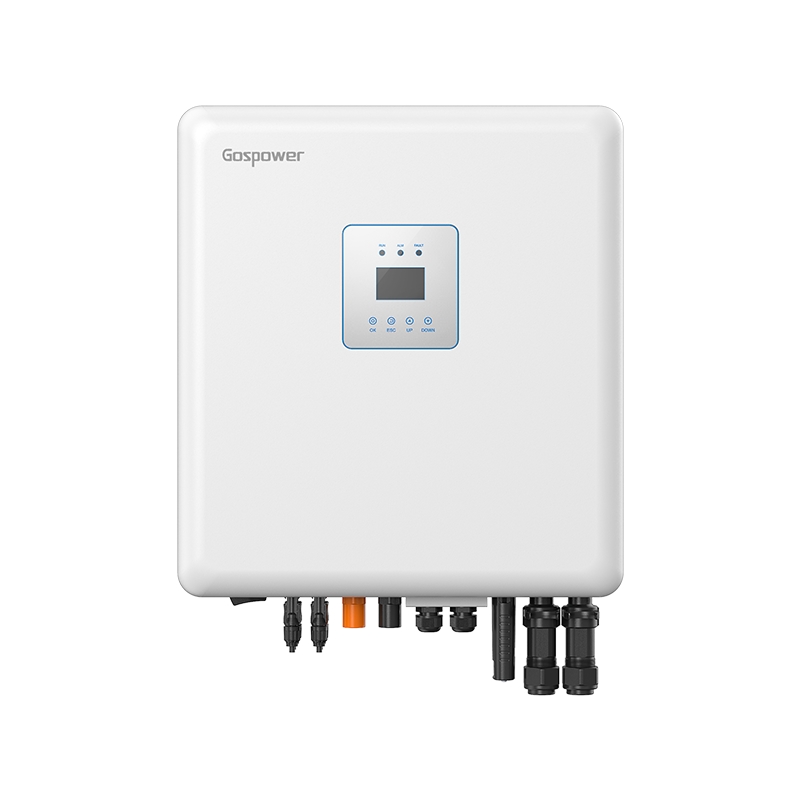Search
What Are You Looking For?
What Are You Looking For?
Solar power systems have become a cornerstone of sustainable energy solutions for homes and businesses. At the heart of these systems lies the solar inverter, a device essential for converting and managing the energy harnessed from the sun. This blog explores the vital function of solar inverters, focusing on their roles in residential solar hybrid systems, single-phase off-grid setups, and the advantages of built-in Maximum Power Point Tracking (MPPT) technology.
Understanding the Function of a Solar Inverter
A solar inverter is a key component in any solar power system. Its primary function is to convert the direct current (DC) electricity generated by solar panels into alternating current (AC) electricity, which is the form used by most household appliances and the electrical grid. This conversion is crucial because, without it, the electricity produced by solar panels would not be compatible with standard electrical systems.
Types of Solar Inverters
Solar inverters come in various types, each designed to meet specific needs and applications:
String Inverters: Commonly used in residential and small commercial installations, string inverters connect a series (or string) of solar panels to a single inverter, which converts all the DC power from the panels into AC power.
Microinverters: These inverters are installed on each individual solar panel. This allows for more efficient energy conversion and system monitoring, as each panel operates independently.
Hybrid Inverters: These are designed to work with both solar panels and battery storage systems, making them ideal for residential setups that require energy storage.
Off-Grid Inverters: Specifically built for off-grid systems, these inverters operate independently of the electrical grid, making them suitable for remote or standalone applications.
Residential Solar Hybrid Inverters
A residential solar hybrid inverter is a versatile device that combines the functionalities of a standard solar inverter with the ability to manage energy storage systems. This type of inverter not only converts DC to AC power but also manages the flow of energy between solar panels, batteries, and the grid. In a hybrid system, the inverter can prioritize the use of solar energy and stored battery power, reducing reliance on grid electricity and enhancing energy independence. Additionally, during power outages, hybrid inverters can provide backup power, ensuring uninterrupted electricity supply.
Single Phase Off-Grid Inverters
Single phase off-grid inverters are designed for systems that operate independently of the electrical grid, typically in remote or rural areas. These inverters are essential for converting DC power from solar panels into AC power for use in homes or businesses that are not connected to the grid. Single phase off-grid inverters are robust and reliable, capable of handling the variable power output from solar panels and ensuring a consistent supply of electricity. They are often used in conjunction with battery storage systems to provide a steady and reliable power source, even when solar production is low or during nighttime.

The Advantage of Solar Inverters with Built-in MPPT
Modern solar inverters often feature built-in Maximum Power Point Tracking (MPPT) technology. MPPT is a crucial feature that optimizes the efficiency of the solar power system by ensuring that the solar panels are operating at their maximum potential. It continuously adjusts the electrical load on the panels to maximize energy harvest, even under varying conditions such as shading or temperature changes. This results in higher overall efficiency and greater energy output from the solar panels, making the entire system more effective and reliable.
Solar inverters are indispensable components of any solar power system, playing a vital role in converting and managing the energy produced by solar panels. Whether you're setting up a residential solar hybrid system, a single-phase off-grid setup, or utilizing the benefits of an inverter with built-in MPPT technology, understanding the function and importance of solar inverters is essential. As solar technology continues to advance, solar inverters will remain a critical element in our journey toward a sustainable and energy-independent future.